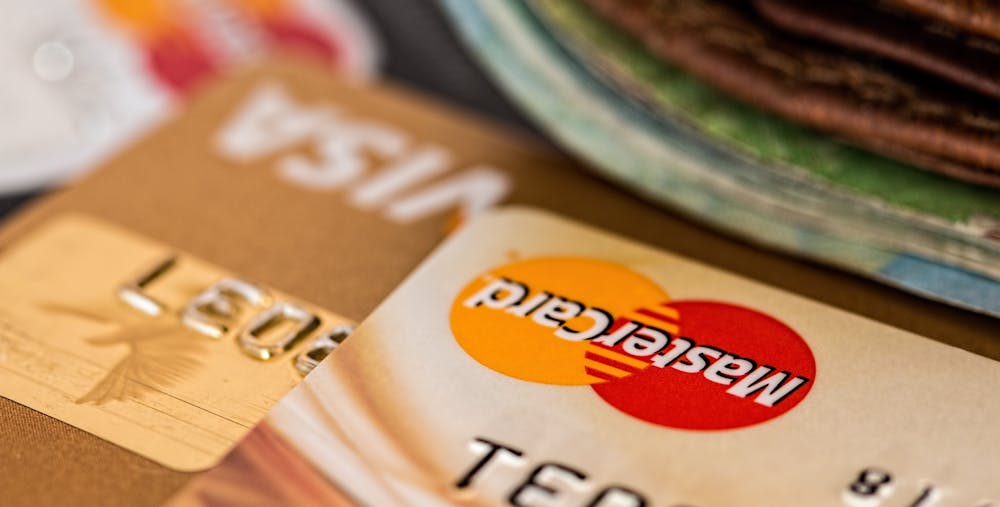Your complete guide to credit cards in Ireland
Credit cards are a flexible way to pay and borrow. In Ireland, purchases can be interest-free for up to 56 days, and a €30 annual stamp duty applies. This guide explains how credit cards work and how to choose the right one.
What’s in this guide?
Part 1
How credit cards work
Who this guide is for
This guide is designed to help you if you’re:
If you’re looking for detailed comparisons or specific deals, we’ll link you to dedicated guides and comparison pages throughout.
What is a credit card?
A credit card lets you borrow money from a lender to make purchases or withdraw cash, up to an agreed credit limit.
You receive a monthly statement showing what you’ve spent. You can either:
- Pay the balance in full, or
- Repay part of it and pay interest on the remaining amount
Interest is charged at the card’s APR (Annual Percentage Rate) if you don’t clear the balance in full by the due date.
Credit cards are commonly used for:
Used responsibly, they can be a convenient payment tool. Used incorrectly, they can become an expensive form of borrowing.
How do credit cards work?
A credit card works like a debit card, but the money you spend is borrowed from your bank or card issuer. The amount you can spend depends on your credit limit.
At the end of the billing month, a statement will be made available for you to view online, in an app, or by post.
Your credit card statement will tell you:
- How much you’ve spent
- How much cash you’ve withdrawn
- Interest charged or due
- Your total balance and what you owe
- The minimum payment you must make
If you’re new to credit cards, two things matter most: minimum repayments and when interest applies.
Minimum repayment
Each month, your statement shows the minimum amount you must pay. This is usually a small percentage of your balance.
Paying only the minimum keeps your account in good standing, but it means your debt will take longer to clear.
Interest
If you don’t pay your balance in full by the due date, interest is charged on the remaining amount at the card’s APR (Annual Percentage Rate).
Interest can add up quickly, which is why credit cards work best when balances are cleared each month.
What is a credit limit?
It’s the amount your credit card provider is prepared to lend you. Your credit limit is the maximum amount you can owe at any point and will be based on your income, outgoings and credit history.
You can request a credit limit but you’ll only find out how much you’ve been granted if your application is approved.
Find out more about credit limits and how to boost them in our guide How credit limits work.
How is your interest rate decided?
Your interest rate may differ from the ‘typical APR (Annual Percentage Rate)’ and is based on your credit history and financial circumstances.
Card issuers use your credit history to work out how much risk they are taking if they offer you credit; so your interest rate will depend on your credit rating and repayment capacity.
If you have missed or made late payments on a loan, credit card or mobile phone bills in the past, it could have a negative impact on your credit rating.
- Poor credit rating: If you have a bad credit history or no credit history at all, you are considered high risk and the interest rate offered will be higher, which means you’ll pay more for credit facilities.
- Good credit rating: If you have a high credit score because you’ve been a reliable borrower and haven’t defaulted on payments you’ll likely get offered the typical APR.
- Financial status: Banks and card issuers also look at your income and employment status to assess your repayment capacity. Your income is a major factor in determining your credit limit. Card issuers may also take into account your outgoings and borrowing commitments.
Find out how your credit rating works and what you can do to improve your credit score.
When is credit card interest charged?
The interest you’ll pay depends on your provider’s APR (Annual Percentage Rate) and what you spend. The card issuer charges interest on the amount you owe.
Interest only kicks in when you don’t pay your statement balance in full by your due date.
You can pay off the amount you owe in full at the end of each month or make smaller repayments. If you don’t pay the balance in full by the due date, the unpaid sum carries over to the following month with interest applied.
What does APR mean?
The annual percentage rate (APR) is used to help you understand the cost of borrowing. It’s the official rate used for comparing credit cards and unsecured loans.
It takes into account the interest rate and additional charges of a credit offer, but not penalties, like late payment fees.
The APR you are offered depends on your credit history and repayment capacity and may differ from the “typical APR” advertised which is the rate given to the majority of customers.
For example:
| If you | What happens |
|---|---|
| Pay your balance in full | No interest on purchases |
| Pay part of the balance | Interest charged at APR |
| Miss the due date | Interest + possible fees |
Part 2
Types of credit cards
Types of credit card
There are several different types of credit cards; each offers unique benefits and is designed for a different purpose, such as spreading costs, reducing interest, or earning rewards.
The main credit card types and features in Ireland are:
- Purchase credit cards These cards may offer 0% interest on new purchases for an introductory period. Discount rates tend to last for three, six or 12 months.
- Balance transfer credit cards Move your balance to a new card to cut interest and save money. Many cards have a low or 0% interest on transfers for an introductory period.
- Money transfer credit cards These cards allow you to transfer money from your credit card to your current account and may come with a low or 0% introductory rate.
- Rewards credit cards These cards offer incentives to use them, like cashback on shopping, travel rewards and other perks. Ideal if you shop and travel often.
- Student credit cards Credit limits and interest rates tend to be lower with these cards designed for students. You’ll have to prove you’re a third level student at an eligible institution.
- Prepaid credit cards Prepaid cards are not strictly credit cards because you have to preload, but they offer the same payment protection you’d get from a credit card.
Credit cards with an instalment plan option: Some cards offer the option to pay for goods over a certain amount on fixed monthly instalments at a low interest rate. Credit cards with this feature are helpful for budgeting the cost of large purchases when your introductory periods end.
These plans are separate from standard credit card borrowing and usually apply only to eligible purchases over a set amount.
Quick guide: matching card types to common needs
Alongside different card types, credit cards also come with built-in consumer protections that can be useful if something goes wrong with a purchase.
Refund rights when you pay by credit card
One of the key benefits of using a credit card is the added protection it offers if something goes wrong with a purchase.
If you pay by credit card and a retailer fails to deliver goods, provides faulty items, or goes out of business, you may be able to ask your card provider to reverse the transaction through a process known as Chargeback.
Chargeback rights vary by provider and card scheme, and time limits apply. It’s important to contact your card issuer as soon as possible if you have an issue.
You can find out more about how the Chargeback scheme works by reading our guide to your refund rights.
Purchase cards in action
If you spend €1,000 on your credit card with an APR of 20% and pay back €90 per month it would take 13 months and cost you an extra €115 in interest.
With an introductory rate of 0% APR for six months (reverting to 20% APR thereafter), no interest is charged during the introductory period, meaning it would take 12 months to pay off the balance and cost you €25.
This shows how a 0% purchase offer can significantly reduce interest costs compared to a standard rate.
Part 3
Credit card costs
Typical credit card costs in Ireland
Stamp duty on credit cards
The current stamp duty rate for credit cards is €30 per year per credit card account.
In Ireland, you pay a ‘Government Stamp Duty’ on your credit card account, which your card issuer will typically collect on 1st April each year in arrears.
The €30 government stamp duty applies per active credit card account, even if you don’t use the card.
Most credit card issuers won’t charge an account fee for your card; however, some with travel rewards and extra perks charge a monthly fee, so always double-check before you apply.
Do you have to pay Stamp Duty on each credit card?
You only pay for the credit card account. So, you could have more than one card on your credit card account and pay the €30 Stamp Duty fee once.
However, you’ll pay €30 for each account if you have multiple credit cards with different banks.
How to calculate interest rate charges
The interest you are charged each month depends on the APR you are given and how you use your card. The higher the APR, the more you will pay for the money you have borrowed.
Under legislation set by the Central Bank in 2022, new credit card accounts cannot have an Annual Percentage Rate (APR) of over 23%.
Your credit card provider will calculate what you owe each month but here’s how to work out the monthly rate of interest you’ll pay on a balance:
- Divide your APR by 365 to find your daily interest rate
- Multiply your balance by the daily interest rate
- Multiply your daily interest rate by the number of days in your monthly bill
You may be charged different interest rates for purchases, cash withdrawals and transfers, so check with your provider to ensure you understand what you’re being charged.
The best way to avoid paying interest is to pay your entire balance in full each month.
Example: How credit card interest builds up
The example below shows how different repayment amounts and APRs can affect the total cost of borrowing on a credit card.
| Balance carried | APR (Annual Percentage Rate) | Monthly repayment | Interest paid over a year |
|---|---|---|---|
| €800 | 20% | €40 | €88 |
| €800 | 20% | €80 | €44 |
| €800 | 0% (intro period) | €80 | €0 (during promo) |
Understanding how interest works makes it easier to see why choosing the right card can save you money.
Balance transfer cards in action
If you carry a balance of €1,500 on a credit card with a 20% APR (Annual Percentage Rate) and repay €125 per month, it would take around 14 months to clear and cost about €188 in interest.
Moving that balance to a lower-rate card makes a big difference. At 5% APR, you’d clear the balance in roughly 13 months and pay about €42 in interest.
With a 0% balance transfer card, the same repayments would clear the balance in 12 months with no interest charged during the promotional period.
Part 4
How to choose the best credit card
There are so many features to compare when you’re thinking about a credit card it’s often difficult to tell which card is best for your needs. Here’s our tips to help you pick the right card and compare features, so you get the best deal.
Pick the right credit card for you
When choosing a credit card, think about how you plan to use it and what features would benefit you most.
Some credit cards help spread the cost of major purchases, whereas others can help you reduce your existing credit and loan debts. If you’re a keen shopper, look for a credit card with rewards like cashback or travel perks.
Think about what you want from your credit card and pick one that best suits your financial situation.
| Example use | Look for cards with… | |
|---|---|---|
| Major purchases | Low APR (Annual Percentage Rate) on purchases | |
| Reducing existing credit card debt | Low APR on balance transfers | |
| Regular travel abroad | Foreign transaction fees waiver or travel rewards | |
| Regular small purchases | Cashback rewards | |
| Studying at University | Student card | |
| Irregular cashflow | Money transfer options | |
| One-off purchase over €500 | Instalment plan options |
Find a credit card that’s right for you. Compare to find the lowest APR, the longest introductory rates and the best features.
How to compare credit cards
Once you’ve decided the type of credit card you want, shop around for the best credit card deal. Here’s what to consider when you’re comparing cards:
Part 5
Applying for a credit card
Discover the best 0% purchase and balance transfer cards in Ireland.
How to apply for a credit card
You can apply for a credit card with your existing bank or another credit card provider.
Applying with your own bank may be quicker, but not necessarily the best card for your needs, so it’s worth shopping around.
Credit card providers have various preferred methods of application. Some require an online application, whereas others prefer to take your application by telephone or in person at a branch.
Before completing a full application, your bank or card issuer may take you through an eligibility check. For this, you’ll need to provide your basic income and outgoings. This affordability check will tell you whether your application is likely to be accepted.
If you decide to go ahead with your application, you’ll need to provide official documents with personal and financial information and undergo a full credit check.
Credit providers are required by law to complete a credit check with the Central Credit Register (CCR).
What documents do you need to apply for a credit card?
In addition to your name, contact information and date of birth, you will need:
- Personal Public Service Number (PPSN) or Individual Tax Reference Number (TRN)
- Evidence of your identity e.g. Passport, Driving Licence, P45
- Addresses for the last three years
- Income details, e.g. payslips, tax assessment
- Bank details
Are you eligible for a credit card?
Each card provider has different eligibility criteria, but the basic requirements are:
- Over 18 years of age
- A permanent resident of the Republic of Ireland
- In receipt of a regular income for over six months
- Earning over €16,000 (this threshold varies*)
- Pass an eligibility and credit check
*Some cards, like the Revolut credit card and student credit cards, have no minimum income requirement.
Can you get a credit card with bad credit?
Yes, it’s possible to get a credit card with bad credit in Ireland, but your options may be more limited. You will likely pay a higher interest rate, so borrowing will be more expensive.
Having a history of unpaid loans, late payments or a poor credit score will make it more difficult to get a credit card, but a specialist lender may be able to help. Different lenders have their own criteria for approving credit; some are more stringent than others.
A good first step to getting a loan with bad credit is to check your credit score and work on repairing it so you can get better credit facilities in future.
Most card providers carry out a credit check before approving an application. If you have missed payments, defaults or a short credit history, you may be offered:
- A lower credit limit
- A higher interest rate
- Fewer card options
Using a broker to find the best loan for bad credit can be helpful. This means individual credit checks don’t harm your score further, and you may get access to more lenders.
Credit card FAQs
Do credit cards affect your credit score in Ireland?
Yes. Using a credit card responsibly can help build your credit score, while missed or late payments can harm it.
Making repayments on time and keeping balances low relative to your credit limit are key factors in maintaining a healthy credit record.
Is it better to pay off a credit card in full each month?
Yes. Paying off your balance in full each month means you usually won’t pay interest on purchases and helps keep borrowing costs low.
Paying only the minimum avoids penalties, but interest will apply to the remaining balance.
Are credit cards safer than debit cards for online shopping?
In many cases, yes. Credit cards often offer stronger purchase protection and chargeback rights if something goes wrong with an online transaction.
This can make them a safer option for higher-value or online purchases.
What happens if you miss a credit card payment?
If you miss a payment, you may be charged a late fee and interest may apply to your balance.
Repeated missed payments can negatively affect your credit record and make it harder to access credit in the future.
Do all credit cards charge foreign transaction fees?
No. Some credit cards charge fees for spending abroad, while others offer reduced or no foreign transaction fees.
It’s important to check the terms and conditions before using your card outside Ireland.
Is there a limit to how many credit cards you can have?
There’s no fixed legal limit, but each additional card comes with a €30 annual government stamp duty and is subject to lender approval.
Holding multiple cards can also affect how lenders assess your creditworthiness.
Compare Ireland's best credit cards
Find top 0% credit card deals and apply today









